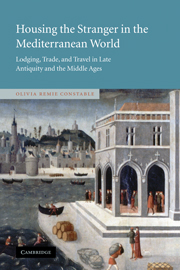 Housing the Stranger in the Mediterranean World
Housing the Stranger in the Mediterranean World Book contents
- Frontmatter
- Contents
- List of illustrations
- List of maps
- Acknowledgments
- Introduction: A culture of travel: words, institutions, and connections
- 1 “Accepting all comers”: a cross-cultural institution in late antiquity
- 2 The transition from Byzantium to the Dār al-Islām
- 3 Commerce, charity, community, and the funduq
- 4 Colonies before colonialism: western Christian trade and the evolution of the fondaco
- 5 Conquest and commercial space: the case of Iberia
- 6 Fondacos in Sicily, south Italy, and the Crusader states
- 7 Changing patterns of Muslim commercial space in the later middle ages
- 8 Christian commerce and the solidification of the fondaco system
- 9 The fondaco in Mediterranean Europe
- Conclusion A changing world: new peoples and institutions in the early modern Mediterranean
- Selected bibliography
- Index
3 - Commerce, charity, community, and the funduq
Published online by Cambridge University Press: 27 August 2009
- Frontmatter
- Contents
- List of illustrations
- List of maps
- Acknowledgments
- Introduction: A culture of travel: words, institutions, and connections
- 1 “Accepting all comers”: a cross-cultural institution in late antiquity
- 2 The transition from Byzantium to the Dār al-Islām
- 3 Commerce, charity, community, and the funduq
- 4 Colonies before colonialism: western Christian trade and the evolution of the fondaco
- 5 Conquest and commercial space: the case of Iberia
- 6 Fondacos in Sicily, south Italy, and the Crusader states
- 7 Changing patterns of Muslim commercial space in the later middle ages
- 8 Christian commerce and the solidification of the fondaco system
- 9 The fondaco in Mediterranean Europe
- Conclusion A changing world: new peoples and institutions in the early modern Mediterranean
- Selected bibliography
- Index
Summary
In contrast to the relatively scant references during the early Islamic period, the funduq flourished throughout the Muslim Mediterranean world by the eleventh and twelfth centuries. Arabic and Judeo-Arabic texts from Ayyūbid Syria to Almoravid Spain frequently mention funduqs and other hostelries, making clear that these were a common and established component of urban infrastructure. Major trading cities might have a hundred or more funduqs within their walls, and the geographer al-Idrīsī reported an astonishing 970 funduqs in the Andalusi port of Almería in about 1150.
Although ubiquitous, funduqs remain a little-studied, and thus poorly understood, element of Muslim urban society and economy. What was their function? Data on funduqs from the eleventh, twelfth, and thirteenth centuries show the maturation of trends that were already perceptible in the early Islamic period. First and foremost, funduqs were commercial spaces, serving the needs of merchants for lodging, storage, and security. They also functioned as sites where urban administrators could collect taxes on commercial transactions, regulate the distribution of certain goods, and monitor the activities of merchants. Meanwhile, these hostelries also provided charitable accommodation, sheltering pilgrims and the poor, or they generated income for pious endowments (waqfs). After a survey of these commercial and charitable functions, the chapter considers the architecture, amenities, and administration of funduqs; their ongoing association with drinking, prostitution, and crime; and their role in fostering communal identities in the medieval Islamic world.
- Type
- Chapter
- Information
- Housing the Stranger in the Mediterranean WorldLodging, Trade, and Travel in Late Antiquity and the Middle Ages, pp. 68 - 106Publisher: Cambridge University PressPrint publication year: 2004
